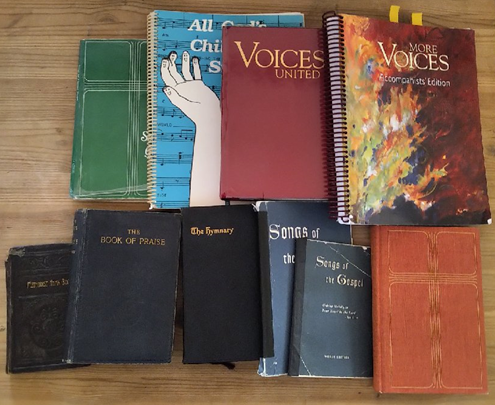Which seems to be the way of the world these days and even this week. I took coffee down to the RCMP this week. They were all on the road driving around the community responding to alerts and watching for black vans with Saskatchewan license plates. One more small sign that the world is on edge and people are feeling stress and uncertainty. Losing the Queen of Canada, whether you loved or hated her, just adds to the situation.
We are afflicted or know
someone who is afflicted. We are foolish
or know someone who is acting foolish.
And we fall into the blame game too easily. I can get all indignant at ‘those foolish
people’ that are adding to our stress, whether it’s disaster after disaster
that leads to disaster fatigue, or people who continue to deny climate change
even after California’s heat bubble reached 46-degree weather and Death Valley
measured a dangerous 54C! Dry winds like what we read in Jeremiah! Foolish people determined not to change, not
to take responsibility for their choices, for their actions, from the person
who starts down the slippery slope to hard drugs to the polluting executives
mining heavy minerals and even sand in unsustainable ways that damage the
environment even more. Foolish people
who refuse to admit they need help.
Foolish people who don’t ask the hard questions. One Facebook post said it like this, “why is
it always ‘if you can’t pay rent, buy fewer lattes and avocado toasts’ and not
‘if you can’t pay your employees a living wage, buy fewer yachts and real
estate”? Foolishness. Not just by one
person, but by whole cultures that lead to floods in Pakistan that have
impacted hundreds of thousands of people, triggered in part by glacier melt. Our
whole world has been suffering from the poison of wealthy people who are not
satisfied with the wealth and power they have accumulated and who are
determined to accumulate even more. Who knows, maybe that obsession was also at
the root of what went down in Saskatchewan.
It’s not just the rich and famous who struggle, but you and I probably
have moments where we wished we had something more. Sometimes I envy the folks who ride around in
their noisy speed boats and seadoos, sometimes I resent how much noise and
waves they throw into the environment.
Oh foolish me!
Where is God in all this
mess? Jeremiah has a vision of an angry
God, fed up, planning to punish us all for our foolishness, and when I think
about the floods, fires and heat, I know it’s not God’s punishment on us, but
the natural consequences of an accumulation of decisions large and small that
do not treat the environment with respect.
Our actions cause the birds to fly away and the fertile lands to turn to
deserts. The earth mourns and the seas
die, choked with islands of plastic, coral in the Great Barrier reef dying from
heat exhaustion, our glaciers and icebergs in the far north thawing to the
point that polar bears are starving.
Homeless people and those living in substandard housing are struggling
to deal with heatwaves. As the weather
cools, we will struggle with high heating bills and food costs. It’s insane!
But no matter how foolish we
are, no matter how lost we are, there is still hope for us. There is still the good shepherd who goes
looking for the one foolish lost sheep, the woman who cleans her house from top
to bottom until she finds her lost bride gift. There will be more rejoicing
over the foolish ones reconciled to God than the ones who were always safe and
wise. And there are many wise ones
working hard to learn how seaweed captures carbon, how to protect the reefs
from the blazing sun, how to maintain the oxygen levels in lakes and wean us
off our addiction to carbon fuels.
We can make a difference when
we remember that all creation is worth loving, and when we remember that we can
do amazing things when we work together for the benefit of all. 21 years ago, Frazer Road United Church,
about double the size of this church, found themselves entertaining 200 people
from the Middle East. They had borrowed
cots from the military base and set out tables loaded with food and necessities
for their guests. Some had to sleep on
the pews with only the blanket and pillow they had from their plane. Those
strangers had been in an airplane on a runway for over 24 hrs in dangerous heat. The church had communities and other churches
bringing food in from as far away as three hours to feed the stranded
passengers. Casseroles and meals were
stored in the community hockey rink on the ice, yet not one passenger came down
with food poisoning the whole time they were there. There was not a single episode of crime or
violence despite the stress and tension of not knowing when they would get
home. One of my friends who now is an
Ordained Minister in Alberta, was there, in Fraser Road United, Gander
Newfoundland, and shared her personal memories with me after I had raved about
seeing Come From Away.
We have similar stories of how
we helped evacuees from Slave Lake and Fort McMurray. We know how to love our neighbors. We know we can pull together and learn how to
be wise with God’s help. It may be as
small as a paper straw from a restaurant, or as big as solar panels on our
rooves. With God’s grace, we can learn to be wise and loving of our whole
world. It won’t be easy. It took several generations for Jeremiah’s
people to rebuild from the disaster their foolishness brought on them, and it
will take several generations for us to do the same. But if we listen and do our parts, we too can
be part of a community that lives into our quest to live with respect in
creation. May it be so for us all.









